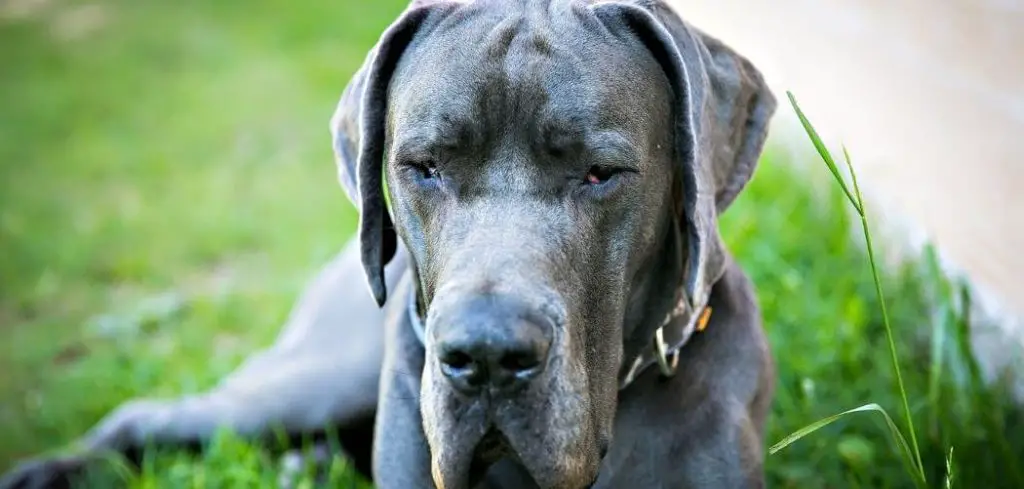When an old dog is not eating or drinking and appears lethargic, it is a serious warning sign.
Reduced appetite and water intake, combined with low energy, can indicate systemic illness, organ dysfunction, or severe dehydration. Senior dogs can deteriorate quickly, so timely assessment is essential.
We outline the common reasons why an old dog may not be eating or drinking and is lethargic, what you can do at home, and when to seek veterinary help.
Old Dog Not Eating or Drinking and Lethargic — Why It Happens
An old dog that is not eating or drinking and is lethargic is often experiencing a serious underlying health issue. Common causes include organ failure (such as kidney or liver disease), severe infections, dehydration, pain, or even cancer.
Lethargy combined with refusal to eat or drink signals that the body is struggling to function normally.

Old Dog Not Eating or Drinking and Is Lethargic: Common Causes
Kidney Disease
Kidney dysfunction reduces appetite and can decrease water intake in older dogs experiencing nausea or discomfort.
Other signs include frequent urination, vomiting, weakness, and weight loss. Persistent dehydration can worsen kidney function, making early veterinary intervention critical.
Read more: Old Dog Not Eating or Drinking (Hydration and appetite concerns)
Liver Disease
Liver problems can cause lethargy, nausea, and appetite loss.
Dogs may also show jaundice, vomiting, or abdominal discomfort. Decreased thirst may further contribute to dehydration. Prompt veterinary care is essential to manage liver conditions and prevent further decline.
Infections
Bacterial or viral infections, including urinary tract infections, pneumonia, or systemic infections, can reduce appetite, water intake, and energy.
Older dogs may show fever, weakness, or disorientation. Early detection and treatment are crucial to prevent sepsis or organ failure.
Pain or Arthritis
Pain from arthritis, injury, or chronic illness may discourage eating, drinking, or movement.
Dogs may appear lethargic, reluctant to stand, or show discomfort when moving. Addressing pain can improve appetite, hydration, and overall quality of life.
Heart Disease
Heart conditions in senior dogs can reduce appetite and energy.
Signs include lethargy, rapid or labored breathing, coughing, and reduced stamina.
Heart disease can cause fluid retention or reduced circulation, making nutrition and hydration even more critical. Veterinary care can provide treatment and lifestyle adjustments.
Cancer
Cancer affecting internal organs or the gastrointestinal tract can cause anorexia, lethargy, and dehydration.
Other signs include weight loss, vomiting, or weakness. Early veterinary assessment helps determine the cause and allows treatment options to maintain comfort and slow disease progression.
Read more: Old Dog Not Eating or Pooping (Digestive and elimination issues)
What to Do If Your Old Dog Is Not Eating or Drinking and Is Lethargic
Offer small, palatable meals such as soft canned food or boiled chicken to encourage eating.
Ensure water is accessible at all times, and consider adding ice cubes or low-sodium broth for hydration support.
Monitor energy levels, appetite, and water intake closely. Avoid forcing food or water, which may cause stress or aspiration.
Provide a calm, comfortable environment with supportive bedding and minimal disturbances to reduce stress and encourage intake.
When to Call or Visit Your Vet
Immediate veterinary care is required if your dog:
Refuses food and water for more than 24 hours
Shows severe lethargy, weakness, or collapse
Exhibits vomiting, diarrhea, or blood in urine/stool
Displays signs of pain, labored breathing, or swelling
Early veterinary evaluation helps diagnose organ disease, infection, heart conditions, or cancer, ensuring appropriate treatment to prevent rapid deterioration.
Read more: Old Dog Not Eating (Causes and what to do)
Key Takeaway
When an old dog is not eating or drinking and appears lethargic, it often signals serious medical issues requiring urgent attention.
Supportive care includes small, soft meals, constant access to water, and a comfortable environment. However, persistent anorexia, dehydration, or lethargy demands immediate veterinary evaluation to prevent complications and maintain your senior dog’s health and comfort.
